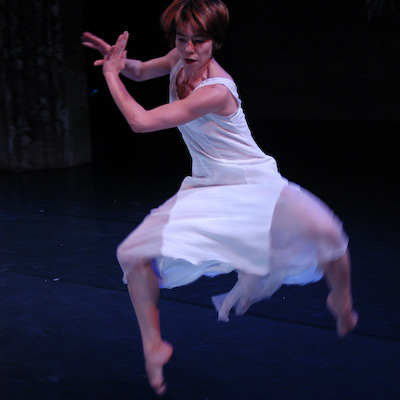FRINGE SHORTS: “small aïda” by Penelope Freeh
Critic Lightsey Darst loved noted dancer and choreographer Penny Freeh's (James Sewell Ballet) ambitious rendering of Verdi's classic opera into a wordless narrative told in dance. Read on, and she'll tell you why.

Penelope Freehs stated intention for her small aïda is to capture the drama of the opera, but in the small: with only two dancers, one hour, and a minimal set. Itll come as no surprise to anyone familiar with Freehs modern ballet choreography that she succeeds. Grand passions are in this womans DNA, maybe; no question theyre in her cheek-and collarbones, her and co-star Stephanie Fellners fiery dancing, her sense of space, and her restless mind. The Fringe is full of niche productions and reliable variety shows, but Freehs small aïda is a Big Show, sweeping and ambitious.
The operas plot is trouble for anyone hoping to turn Aïda into a wordless dance. On her blog, Freeh worried she wouldnt be able to convey the story; at the start of the show, I was kicking myself for not having looked up a plot outline. We should both have just relaxed. Dont look up the plot, and if you know it, forget about it. Freeh gives you the basicslove triangle, two women of unequal status, slave and princess, the man a hero and a blank. Beyond that, Freeh doesnt exactly color inside the lines anyway. Her Amneris (the unloved woman) seems to kill Radames (the beloved) as her final way to keep him, in a scene thats emotionally true but counter to the operas version. Freehs version explores the womens longing, not the story of conquest or honor. Towards the end of small aïda, Aida and Amneris jump, arms outstretched, both desperate for a lover who never really belonged to either. Freeh also adds a frame of reality around the opera, in the form of the real-life, long-time friendship between herself and Fellner, which works to ground their staged emotion. Freeh and Fellner arent princesses or slaves, they arent mad with love, and yet they can find those emotional states within themselves; they can find an Aïda, a small but no less intense one, curled in their lives. And, watching them, so can the rest of us.
But Freeh does run into some plot trouble. Once the initial love triangle is established, theres a little dead air, a little emotional stagnation. And I hate to critique the program notes, but I felt misdirected by them; they led me to expect something more explicit than implicit, something more dependent on exterior definition. This Aïda doesnt need explanation. Freehs notes, by pinning it down, hem it in.
Which is more of a shame because, for all the concept, small aïda is a visceral experience. Freehs choreography is dense and intense, every muscle in strain. A twitch, a tic, a sudden jerk, a barely kept balanceeverything is pushed to its limits, nothing is easy. One motion can serve as example: sitting on the floor, the dancers slip one leg over the other, one foot pointed and the other flexed, forming a lock of contrary intentions. Most choreography creates a symbolic language of movement, but Freehs is so sharp, so specific, you sense she could write a dictionary for it. Holding one arm in ballets curved fifth position over her head, Freeh painfully lifts the other arm to match. As soon as she reaches fifth, though, her arm drops, and she has to start over. The translation: Amneris wants to triumph (fifth position=triumph), but she cant forget her pain over Radamess death. If you see the movement, though, you wont need the translation: Freehs choreography speaks clearly in its own muscular language.
small aïda is showing at the soon-to-be-defunct Theatre de la Jeune Lune. Its sad to be in this beautiful space for perhaps the last time, but Freehs work does give the theater an appropriate send-off. Her sense of visual drama, enacted in a spare but associatively rich design, echoes the Jeune Lune aesthetic, and her big ambition fills the cavernous theater with breath and desire.
About the writer: Lightsey Darst writes on dance for Mpls/St Paul magazine and is also a poet and editor of mnartists.orgs What Light: This Weeks Poem publication project.
What: small aïda by Penelope Freeh
Where: Theatre de la Jeune Lune, Minneapolis, MN
When: August 4, 7, 9, 10 (click here for specific performance times)
Admission: $12 (plus a $3 Fringe button)
Check back regularly throughout the Fringe Festival for more short reviews on mnartists.org, sent in from our intrepid performance critics